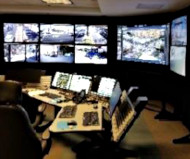11/6/2018
Advocacy Group Takes On Florida License Plate ReadersNew Civil Liberties Alliance argues that tracking motorists with license plate cameras violates the Fourth Amendment.

Florida's automated license plate readers (ALPR, also known as ANPR) are under legal attack. The New Civil Liberties Alliance, a group that seeks to limit the power of administrative agencies, is going after Coral Gables for using thirty cameras to record the movements of everyone passing through the city, regardless of whether there is any reason to suspect they may have committed a crime.
"Using dozens of automatic license plate recognition cameras and software, the city surreptitiously tracks, records, collects, and aggregates the personal and private activities of its citizens and visitors, without any prior suspicion of wrongdoing," the group's attorney, David L. Benjamin, wrote. "It also stockpiles and analyzes this data for at least three years. Furthermore, it shares this data with a private vendor, who sells it to still other governmental entities."
The suit seeks to strike down a Florida Department of State rule that established guidelines for the use of plate readers. The group argues the rules are so loose that they effectively allow unchecked use of these large-scale motorist tracking devices.
"Agencies are supposed to implement the law -- not make it -- and allowing these agencies to govern themselves subverts the democratic process entirely," litigation counsel Caleb Kruckenberg said in a statement.
Coral Gables began using the cameras in 2015 after city leaders cut a deal with Safeware and Vigilant Solutions. The private vendors agreed to operate the cameras and feed the data into the city's "crime intelligence center" for monitoring around the clock. Instead of going after actual crimes, however, the devices are being used to issue tickets to vehicles that have expired registration stickers.
The suit argues that tracking every move of each driver in the city over the course of three years constitutes a search under the Fourth Amendment. The city's database of motorist location records can be accessed even without a reason to suspect a particular individual has committed a crime.
The group is asking the court to order destruction of the illegaly collected records and to declare the state's ALPR guidelines unconstitutional.


